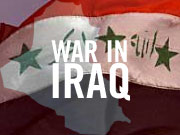Photos
Your Voice
| ||||||||||||||||||||||||
Amid war, White House keeps eye on Bush re-election
April 11, 2003
 |
| President Bush and his advisors have one eye on his upcoming re-election campaign, even as the war in Iraq continues. (White House photo) |
Washington, DC — (AP) - When war ends in Iraq, President Bush will quickly shift focus to his 2004 re-election campaign and the issue that kept his father from winning a second term: a weak economy. The money, message and much of Bush's political machine are already in place.
After weeks of careful planning, the White House hopes to convert postwar political momentum into a string of successes for Bush's domestic agenda - and ammunition for re-election.
The elder Bush failed to capitalize on his popularity after Operation Desert Storm in early 1991, a mistake no Republicans want to see happen again.
"I believe the president will emerge from the war with enhanced ability to stimulate the economy," said House Majority Whip Roy Blunt, R-Mo., a close ally of the White House.
"And that's not only the right thing to do but, obviously, it's the element that has the most potential to have an impact between now and 2004," Blunt said.
Democrats, on the other hand, are looking forward to a shift from war to relative peace as a chance to erode Bush's high job approval ratings.
"Clearly, this president's disastrous record on domestic issues will be a major factor in the 2004 elections," said Democratic Party chairman Terry McAuliffe.
Democrats point to the 2 million jobs lost since Bush took office, as well as a long drop in the Dow Jones industrial average. Republicans predict the economy will start motoring as soon as the shooting stops.
And if that doesn't work, they want Bush to get credit for trying.
While the elder Bush proposed a modest postwar domestic agenda, this Bush is talking big - starting with a $725 billion package of tax cuts.
In a rare retreat, the White House has publicly suggested it would accept less from Congress than Bush proposed, but that may be a dodge: Some advisers predict that the afterglow of war will boost Bush's popularity and help him squeeze concessions from lawmakers. Some of his efforts are cosmetic.
Hoping to avoid the hands-off criticism that hurt his father, Bush stages frequent economic events at the White House and throughout the country. He met with supportive business leaders Thursday, then dispatched them to the front lawn to discuss his economic plan with local and national reporters.
"What the Democrats are missing in this whole thing is this president is great at getting on message and staying on message and the entire White House is perfectly happy with following the script," said GOP strategist Rich Galen.
Bush is also proposing a $400 billion overhaul of Medicare, a program once thought politically untouchable for Republicans.
In outlining his agenda nearly three months ago, Bush also promised new money for research into fuel-efficient cars - a sign that he would not cede environmental issues to Democrats.
The economy may dominate, but the war on terrorism will remain a significant issue in Bush's campaign.
"All he's got to do is remind voters that this is a dangerous age and that Democrats, at best, have a lukewarm support for the military," said GOP pollster Whit Ayres. He said the conflict in Iraq may not fade from view as quickly as Democrats would like.
Though fighting could end soon, White House officials said there is no guarantee that Bush would declare the war over. It could take months to completely secure the nation, said aides who noted that the president has never called an end to the Afghanistan war.
That could cut against Bush. Democrats have long criticized his prewar diplomatic efforts, and are now raising questions about his postwar plans.
"We must hold him to these commitments" to rebuild Iraq, Sen. John Edwards, a Democratic presidential candidate, said on the floor of the Senate on Thursday. "Because in Afghanistan the president's rhetoric about winning the peace looks more and more like an empty promise."
Bush's message will not suffer from a lack of money.
He raised more than $100 million 2001, a record he may double in the upcoming election. His fund-raising team is quietly lining up donors who can start pouring money into the campaign as soon as Bush says he's ready, probably by June.
One of his top money men, Jack Oliver, is expected to move from a top post in the Republican Party to Bush's campaign. Ken Mehlman, White House political director, will run the campaign headquarters.
Karl Rove, the president's top political and policy adviser, will oversee the operation from the White House.
Several longtime Bush associates have moved out of the administration and will be important campaign advisers, including Karen Hughes in Texas, Mindy Tucker in California and Joe Allbaugh in Washington.
Their job will be to cast Bush as a leader who tackles tough issues, both at home and abroad. It is a message designed to link Bush's command of a winning military to his work on an ailing economy - a fusion of politics, policy and war.
(Copyright 2003 by The Associated Press. All Rights Reserved.)
|
News Headlines
|
Related Subjects
|

